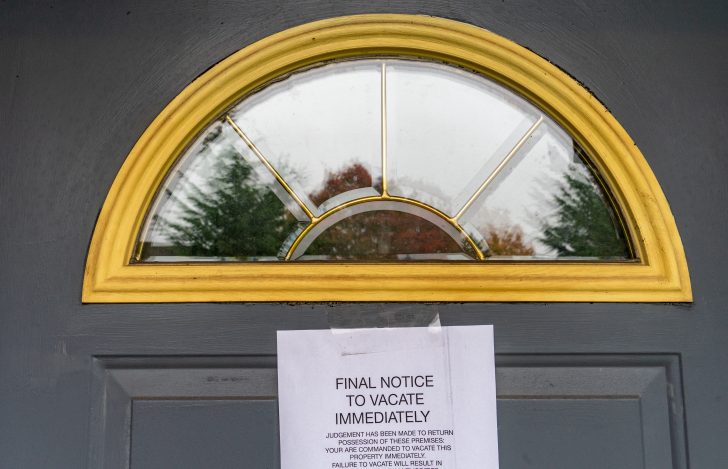What to do if you get served with an eviction notice

11Sep
What to do if you get served with an eviction notice
So you live in San Francisco and have been served with an eviction notice. What does it mean? What do you do? Don’t panic: an eviction notice doesn’t necessarily mean you’re out on the street. You’ve got options, but you’ll need to act quickly, play it safe, and think about getting some outside help early on.
WHAT IT MEANS
Providing you with an eviction notice is your landlord’s first step in the eviction process. [1] If you live in an apartment covered by the San Francisco Rent Ordinance your landlord is required by law to serve you with a written notice before he/she can initiate an unlawful detainer (fancy legal term for eviction) lawsuit against you. In other words your landlord can’t just write you an email or tell you that he’s evicting you. The notice has to: be in writing, posted on your door and mailed, and include certain language to be valid.
COMMON NOTICES
The format of the eviction notice depends in large part on the alleged basis of the eviction and whether your unit is covered by eviction control.[2] Newly constructed buildings have neither rent control nor eviction control. If your unit is not covered by the Rent Ordinance your landlord can evict you upon 30 or 60 days written notice without having to provide a reason (30 days for tenancies of less than one year, 60 for over one year).
NOTICES WHERE THERE IS NO RENT CONTROL
If you live in a building built post- 1979, your landlord does not need to have a “just cause” reason to evict and can simply give you a notice to vacate as explained above. However, you may still be able to fight the eviction. For example, if you are served with an eviction notice within 180 of complaining to your landlord or filing a complaint with a government agency, you may have a defense based on retaliatory eviction. For more information on retaliatory evictions or defenses to non-eviction controlled tenancies contact one of the many California housing rights organizations or check out the many resources available online.
NOTICES UNDER RENT CONTROL
If you are in a unit covered by the Rent Ordinance your landlord must have a “just cause” to evict you. To be valid a notice must state the reason or “just cause” for the eviction. There are 16 just cause reasons for an eviction under the Rent Ordinance. Common reasons include non-payment of rent, nuisance, and landlord move-ins, among others. The type of the notice you get will depend in part on which jof the reasons landlord is asserting. “No fault” evictions for a landlord move-in require a 60-day notice to vacate, while notices based on non-payment require a three-day notice to cure or quit.
THREE DAY CURE/QUIT
In certain circumstances, such as where you have fallen behind on rent, your landlord has to give you the opportunity to “cure” the problem by paying the balance owed, or move out – “quit” - before he/she can file an eviction lawsuit and try to get you out. If you get a cure or quit notice, you should consider curing, provided it’s an option, even if you think the reason for the notice is totally bogus. Example: you stopped paying rent because your landlord refused to fix your broken stove. Rather than continuing to withhold rent consider curing the issue by paying in order to buy yourself time to then talk to an attorney or file a rent board petition. If you refuse to pay, you put your tenancy in jeopardy and possibly having to shell out a bunch of money to fight your landlord in court unnecessarily. In other words, sometimes it’s expensive to be right. Be aware that simply curing the issue – getting rid of the pet in response to a notice that you’ve violated your lease’s “no pets policy,” for example - is not always enough. To properly cure the problem be sure to notify your landlord or their attorney in writing (email is ok, but a certified letter is better) before the notice period has expired. If you can’t cure the defect or don’t feel comfortable compromising, you shouldn’t automatically “quit” the premises for the same reasons discussed below.
THREE DAY QUIT
Not all notices provide an option to cure. Depending on the allegations in the notice, your landlord may not give you the opportunity to cure. This happens most often when the reason for the notice is the result of an alleged lease or legal violation. For example, it’s tough to “cure” swinging that frying pan at your neighbor’s head or cutting down trees in the backyard, no matter how annoying those falling leaves are. If you get a notice to quit your landlord is essentially telling you “move out in three days, or I’m filing an eviction lawsuit.”
You should note that even if you are guilty of committing the violation, you shouldn’t necessarily tuck your tail between your legs and move out. At minimum you should consult with an attorney or housing rights advocate prior to moving out to make sure that’s the right move. Just because you did something wrong doesn’t mean it’s sufficient cause for eviction (though the frying pan or tree examples are probably going to cause you some problems).
If you get served with an eviction notice you need to take the threat seriously and take action to protect yourself. Failure to act could cause the process to escalate and put your tenancy in jeopardy. With rents being what they are these days, that can be a dangerous proposition. If you find yourself faced with an eviction notice or eviction lawsuit, you should educate yourself on your rights and act to protect your tenancy. San Francisco has numerous resources for tenants, such as the San Francisco Tenants’ Union, San Francisco Rent Board, Causa Justia, and the Housing Rights Committee, among others. Whatever you do, don’t assume you don’t have choices before walking away from your home or cutting a deal with your landlord.
[1] Note that an eviction notice is different than a summons and complaint, which is an eviction lawsuit. If you get served with a summons and complaint/ eviction lawsuit you must file a response with the Court within 5 calendar days of receipt, with some exceptions.
[2] A good rule of thumb is that your tenancy is protected if your building/house was built prior to 1979. Your unit may also have “eviction control” without “rent control.”
Related Posts You Also May Like
Get Started
For more information or to discuss your legal situation, call us today at (415) 649-6203 for a phone consultation or submit an inquiry below. Please note our firm can only assist tenants residing in San Francisco, Oakland & Berkeley.





